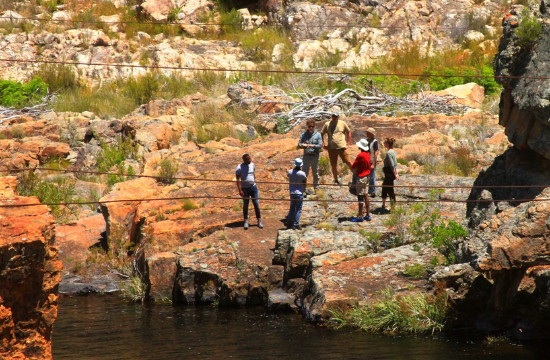
Scientific outcomes will remain shelved unless made relevant for decision making
A new Water Research Commission funded project being introduced to commercial farmers in the Koue Bokkeveld promotes stakeholder involvement to bring the “equitable” in sustainable water management plans.
Project highlights
- Sakhikhaya Mabohlo (MSc-hydrology student) will apply the SWAT model to help improve the quantitative understanding of detailed water balance and estimate future flow scenarios in the context of climate change in Twee and Leeu Rivers
- Stefan Theron (part-time MSc – Water Resource Science) will target the implementation of sustainable water management in the catchment through stakeholder engagement and institutional support through Agent-Based Modelling
- Sinetemba Xoxo (PhD–Hydrology student) aims to test the application of a water sharing tool that takes uncertainty and vulnerability to water deficit into account
The project intends to facilitate a shared water understanding among farmers in the Koue Bokkeveld region, which will lead to a better water management strategy driven by the stakeholders.
The project, which is supported by the Water Research Commission (C2020/2021-00607), and brings together researchers from the Institute for Water Research (RU, ZA), the Freshwater Research Centre (ZA), and the National Research Institute for Agriculture, Food and Environment (ZA), leverages on the combined strength of cognitive power (humans) and simulation capabilities (computing) operating different time steps and local scale. It was presented to the farmers during a WWF organised water workshop at Kunje Guest Farm, Ceres, Western Cape.
MEDITERRANEAN CLIMATE REGIONS COULD SEVERELY DRY UP OVER THE NEXT 20-30 YEARS
Paving the way for the project introduction was Prof. S. Midgley (Climate Change and Risk Assessment Scientist, African Climate & Development Initiative, University of Cape Town) providing an overview of the SmartAgri Plan for the Western Cape [1]. Of the key take home messages from Prof. Midgley highlighted that focusing on the “no regrets” decision pathway could help offset some of the future climate extremes on the food security industry in the Western Cape.
Linking the SmartAgri Plan to the WRC (C2020/2021-00607) project, it is apparent that stakeholder inclusive, and evidence-driven solutions may have a potentially positive impact for the larger Western Cape Province.
At the higher policy level, the project links well with the Governance, planning and management of supply theme of the Water RDI roadmap to 2025.
Although full confidence still needs to be strengthened with the farmers, all presentations were well received by the, with some insightful comments.
It is our hope that a strong long-term partnership will be fostered with the Koue Bokkeveld region stakeholders, and that for their operations, they will find utility in the products being developed.
[1] https://www.greenagri.org.za/smartagri-2/smartagri-plan/
